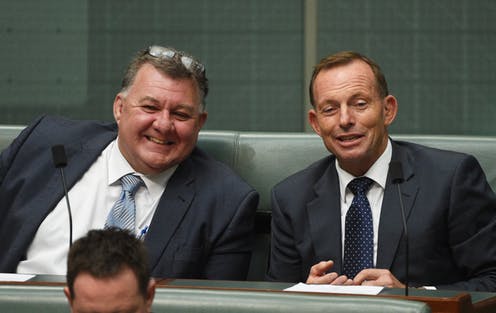The coal industry has a new voice in parliament, in the form of the so-called Monash Forum – an informal government faction featuring former prime minister Tony Abbott and backbench energy committee chair Craig Kelly.
The group, which also reportedly contains former deputy prime minister Barnaby Joyce alongside as many as 11 of his Nationals colleagues, is agitating for the government to go beyond its current energy policy and build a taxpayer-funded coal power station.
As several commentators have pointed out, the move is a calculated push by the usual backbench suspects to put pressure on Prime Minister Malcolm Turnbull, two weeks ahead of crucial talks with state and territory leaders over the design of the National Energy Guarantee (NEG).
Perversely, the Monash Forum’s members want the NEG to prove its “technology neutral” credentials by including coal as well as renewables.
And let’s not forget that the NEG policy was cooked up when it became clear that Chief Scientist Alan Finkel’s Clean Energy Target was unpalatable to Coalition MPs (but not economists).
What’s in a name?
In choosing to form a group like this, opponents of action on climate change are trying to give themselves gravitas, in three possible ways.
First and foremost, they are aiming for the “halo effect” of taking a known public figure and claiming some of his (and it’s usually a he) intellectual cachet. First and foremost here are groups named after scientific figures.
In 2000, a group of climate deniers, including the late Ray Evans and former Labor finance minister Peter Walsh, set up the grandly named Lavoisier Group to undermine progress towards Australian ratification of the Kyoto Protocol and a domestic emissions trading scheme.
Economist John Quiggin probably said it best when he wrote that the group was “devoted to the proposition that basic principles of physics discovered by, among others, the famous French scientist Antoine Lavoisier, cease to apply when they come into conflict with the interests of the Australian coal industry”.
Then in 2011, opponents of Julia Gillard’s carbon pricing scheme created the Galileo Movement – casting themselves, like their Renaissance namesake, as heroic dissidents to an unthinking orthodoxy.
The second aim is to create a name that implies a stolid, no-nonsense approach to policy. One example is the now defunct Tasman Institute, which was an influential voice against climate action and in favour of electricity privatisation in the 1990s.
The third tactic takes this approach a step further, by creating a name that sounds impartial or even pro-environmental, thus obfuscating the group’s true intent, which is to stymie climate policy.
Previous examples include the Australian Industry Greenhouse Network, the Global Climate Coalition, the Australian Climate Science Coalition, and the Australian Environment Foundation, launched in 2005 to the chagrin of the existing Australian Conservation Foundation.
The Monash Forum – with its implied connotations of nation-building and high-minded political debate – is perhaps trying to achieve all three of these goals, this time from within parliament itself rather than the surrounding policy development bubble.
Monash on the march
For the younger readers among us, John Monash was arguably Australia’s most revered soldier, described by British war historian AJP Taylor as “the only general of creative originality produced by the First World War”.
The Monash Forum’s founders also hark back to his role in helping kick-start the exploitation of Victoria’s enormous brown coal reserves in the 1920s.
But the Returned and Services League is not impressed that this former serviceman has been pressed into political service, declaring that “Monash’s name is sacrosanct and should be above this form of political posturing”.
What’s more, the name is bound to create confusion over whether it is affiliated in some way with Monash University (it isn’t), and there will doubtless be some unhappy faces at the Economic Society of Australia’s ESA Monash Forum (which is).
Will coal really make a comeback?
In seeking to deliver new coal-fired power stations, the new Monash Forum is attempting to mine a seam that has already been extensively excavated.
The Minerals Council of Australia, which [merged with the Australian Coal Association in 2013], has been trying for years to kickstart public support for coal.
Who could forget the “Australians for Coal” and “Little Black Rock” campaigns, or last year’s “Coal: Making the future possible”?
But the council’s latest energy and climate policy statement refers to coal only once, prompting headlines that it has gone cold on coal. BHP has considered quitting the council over its pugnacious stance, while Rio Tinto is selling off Australian coal assets.
The mining lobby may soon have to recalibrate its priorities – lithium, anyone?
The problem for coal’s proponents is that most Australians are keen to see the back of it. The promised global wave of “High Efficiency, Low Emission” coal plants has failed to materialise.
And stunts such as Treasurer Scott Morrison waving a lump of coal in parliament are derided by a public who are far more energised by the prospect of renewables.
When he was prime minister, Abbott tried to sabotage investment in large-scale renewables so as to keep the way clear for fossil fuels.
But tellingly, he left subsidies for rooftop solar panels largely untouched, presumably realising that voters saw renewable energy as sensible and viable, on a small scale at least.
The problem for advocates of renewables, and climate action more broadly, is that winning slowly on climate change is the same as losing, as Bill McKibben noted last year.
Perhaps that is the ultimate aim of the Monash Forum and those who share its goals. Renewable energy may win in the end, but it will win slowly enough that coal can earn one last payday.
Source: The Conversation. Reproduced with permission.









